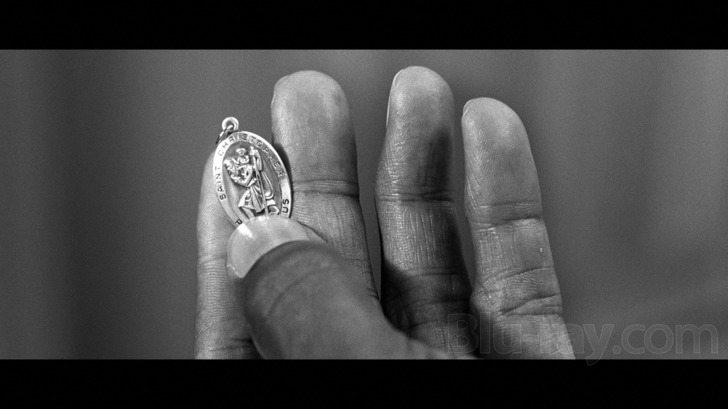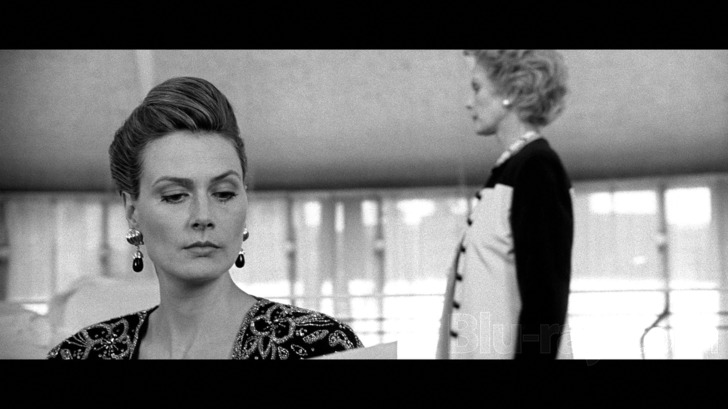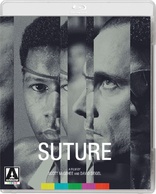Suture Blu-ray Movie
HomeSuture Blu-ray Movie 
Blu-ray + DVDArrow | 1993 | 96 min | Not rated | Jul 05, 2016
Movie rating
6.9 | / 10 |
Blu-ray rating
| Users | 4.2 | |
| Reviewer | 3.5 | |
| Overall | 3.8 |
Overview
Suture (1993)
The wealthy and self-assured Vincent meets his blue collar half-brother Clay at their father's funeral and is struck by their similarity. He decides to murder Clay and take his identity, only Clay survives the assassination attempt with no memory and is mistaken for Vincent.
Starring: Dennis Haysbert, Mel Harris (I), Sab Shimono, Dina Merrill, Michael Harris (I)Director: Scott McGehee, David Siegel (III)
| Drama | Uncertain |
| Thriller | Uncertain |
Specifications
Video
Video codec: MPEG-4 AVC
Video resolution: 1080p
Aspect ratio: 2.35:1
Original aspect ratio: 2.39:1
Audio
English: LPCM 2.0 (48kHz, 16-bit)
Subtitles
English SDH
Discs
Blu-ray Disc
Two-disc set (1 BD, 1 DVD)
DVD copy
Playback
Region free
Review
Rating summary
| Movie | 3.5 | |
| Video | 4.0 | |
| Audio | 4.0 | |
| Extras | 3.5 | |
| Overall | 3.5 |
Suture Blu-ray Movie Review
A stitch in time saves one, if he's lucky.
Reviewed by Jeffrey Kauffman July 13, 2016Some indication of the wide number of influences informing Suture comes courtesy of the copy on the back cover insert, copy which references two great but highly disparate John Frankenheimer films, The Manchurian Candidate and Seconds , along with a similar pairing of Hiroshi Teshigahara’s films, The Face of Another and Woman of the Dunes. Add to that questionably linkable quartet several more Asian films which are mentioned in the commentary included on this release, a commentary which also glances at least cursorily at Edward Dmytryk’s 1965 amnesia thriller Mirage, and those coming to the film "unanointed" (so to speak) may have at least some idea of the intellectual acuity necessary to make it through this particular labyrinth. Suture is a film built upon a seemingly insurmountable conceit: that half-brothers Vincent (Michael Harris) and Clay (Dennis Haysbert) are more or less identical twins, despite the fact that one of them is black and the other white. It’s the sort of structural artifice which is so over the top that it requires the audience to simply surrender and let the narrative take them where it will, without relying on traditional ideas of “logic”. When one adds in a doctor rather cheekily named Renee Descartes (Mel Harris), that whole vaunted “cogito ergo sum” (“I think therefore I am”) philosophy which attempts to define “identity” seems to have been put under a veritable cinematic microscope, dissected and then left in several pieces for the audience to reassemble as it wills. Suture is a fascinating film for any number of reasons, and it contains some lustrous black and white cinematography by Greg Gardiner (Men in Black II, Herbie Fully Loaded), but it may simply be too “tricky” for its own good, at least for some.

Note: Certain important plot points are unavoidable when discussing Suture. Those wary of reading potential "spoilers" are encouraged to skip down to the technical portions of the review, below.
There’s been a kind of interesting evolution in casting since the heyday of the so-called Golden Age of Hollywood. Back in the 1930s and 1940s, “star power” was pretty much all that mattered, and so various box office performers were regularly cast as family members when they had virtually no physical resemblance to each other. This proclivity certainly extended well past the 1940s, of course, but there seemed to be an increasing emphasis on finding actors who at least tangentially looked like each other as films ventured into more ostensibly “realistic” territory as the 1950s gave way to the 1960s, 1970s, and beyond. Suture simply throws that growing caution to the wind, however, positing actors of different races as “twins” (more or less, anyway), an “in your face” (and/or faces as the case may be) gambit that has to be accepted for the film’s wending narrative to even begin to make sense. When Vincent and Clay seem to be reestablishing family ties after years of estrangement in the wake of their father’s death, there’s absolutely no reference to their variant races, and indeed the actual conversation is about how much they look like each other. Really?
Suture’s central conceit is only amplified when it turns out that Vincent has nefarious motives for wanting to reunite with Clay. The opening moments of the film have already detailed a showdown of sorts which sees Vincent and Clay facing each other with guns, and so some sort of conflict is obviously brewing, but the “back story” reveals that Vincent has actually planned to kill Clay in order to assume his identity. Clay, however, survives the murder attempt, albeit in a badly injured form that has also made him an amnesiac. Since Vincent has already swapped IDs (i.e., driver’s licenses and the like) with his supposed half-brother, the medical professionals working to resuscitate Clay assume that he is in fact Vincent.
Suture was an undeniably audacious feature film debut for co-writers and co-directors Scott McGehee and David Siegel, but the film is perhaps ironically too self conscious to convince as a thriller. It’s a fascinating intellectual exercise at times, and it’s that rare sort of film that actually requires the viewer to think about the dichotomy between what’s being portrayed and how it’s being portrayed. All of that said, Suture never builds to any real sense of suspense, despite a creepy opening that would seem to suggest certain doom for at least one character. McGehee and Siegel haven’t been especially prolific, but they’ve almost always been really interesting (What Maisie Knew, Uncertainty). Suture proves that the pair entered the arena with a certain flourish, though one that is probably skewed pretty obviously more toward style than substance, this despite some high-falutin’ imagery (not to mention the whole on the nose notion of black and white cinematography) and quasi-philosophizing.
Suture Blu-ray Movie, Video Quality 

Suture is presented on Blu-ray courtesy of Arrow Video with an AVC encoded 1080p transfer in 2.35:1. Arrow's typically informative insert booklet contains a wealth of information about this transfer:
The original 35mm camera negatives were scanned in 4K resoultion on a pin-registered Scannity at Prasad Corporation Digital Film Technology in Burbank.Some of the most interesting information is actually contained on the following page, however, under the heading A note on the restoration:
Film grading and restoration was completed at Deluxe Restoration, London. Thousands of instances of dirt, debris and light scratches were removed through a combination of digital restoration tools. Overall image stability was also improved.
Additional grading was done at Box Motion Studios, New York under supervision from filmmakers David Siegel and Scott McGehee.
While working on Suture, the restoration team noticed an intermittent banding issue appearing on the images that became more pronounced once grading was applied. Further research revealed this to be a fault of the original negative, most likely the result of lab developer pressure marks from tire rollers during initial photochemical processing. THe negative was re-scanned using different settings in an attempt to diminish the effect of the banding, and a 35mm interpolative [sic?--I assume they mean interpositive] was also sourced to compare the effect against the negative. Unfortunately, neither exercise resulted in a satisfactory solution to the banding issue and no digital restoration process proved to be effective in removing this artifact.Arrow's openness is to be commended, and the funny thing (to me, anyway) is that the banding issue is relatively minor when taken into the overall context. As can be seen in several of the screenshots accompanying this review, detail levels are often fantastically precise, and strong, stable contrast promotes inky blacks and nicely modulated grayscale. There is still some very slight image instability (some noticeable lateral wobble during the credits is one example), and at times the generally nicely resolved grain field verges close to mosquito noise territory (see several screenshots with areas of white, notably the top of the bus in screenshot 8).
[. . .]
As no suitable digital solution could be found to remove this banding effect, the decision was made, together with the filmmakers, to present this restoration of Suture with the issue intact.
Suture Blu-ray Movie, Audio Quality 

Suture's LPCM 2.0 track provides ample support for dialogue and occasional voiceover narration. Occasional musical interludes, like the rolicking Tom Jones tune the commentary jokes cost the team their entire music budget to license, also sound clear and bright with no damage or distortion issues.
Suture Blu-ray Movie, Special Features and Extras 

- Lacerations: The Making of Suture (1080p; 32:25) is a very well done new documentary with good interviews with several principal cast and crew members.
- Deleted Scenes feature optional commentary by the directors:
- Scene 117 (1080p; 1:07)
- Scene 118 (1080p; 00:49)
- Scene 119 (1080p; 1:47)
- Birds Past (1080p; 27:31) is a fun early film from Siegel and McGehee which riffs on Hitchcock's The Birds.
- Stills Gallery (1080p)
- U.S. Theatrical Trailer (1080p; 2:07)
- European Theatrical Trailer (1080p; 1:38)
- Audio Commentary features Executive Producer Steven Soderbergh in a fun and often funny conversation with the directors.
Suture Blu-ray Movie, Overall Score and Recommendation 

Suture is one of those films that appeals quite strongly to certain corners of the intellect while also coming off, at least intermittently and perhaps unintentionally, as the product of a team out to prove just how smart they really are. The film is never less than fascinating, but it's a fascination built upon some fairly shaky artifices that seem ironically to not have been completely thought out. Still, I personally really liked Suture, and this release boasts generally very good to excellent technical merits and Arrow's typical bounteous supply of supplements. Recommended.
Similar titles
Similar titles you might also like

Secret Ceremony
1968

Hitch-Hike
Autostop rosso sangue
1977

Borgman
2013

Monos
2019

Die Screaming, Marianne
1971

Emanuelle, Queen of the Desert
The Dirty Seven / La belva dalla calda pelle
1982

Footprints
Primal Impulse / Le orme
1975

The Nightingale
2018

Faults
2014

La Belle Captive
The Beautiful Prisoner
1983

Cul-de-sac
1966

Z.P.G.
Zero Population Growth
1972

Omar
2013

Vital
2004

Inconceivable
2017

Phoenix
2014

Someone Behind the Door
Quelqu'un derrière la porte
1971

The Crimes of Stephen Hawke
Indicator Series
1936

Let the Corpses Tan
Laissez bronzer les cadavres
2017

The Ones Below
2015
